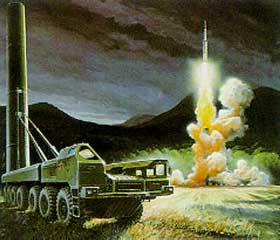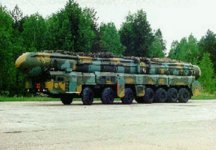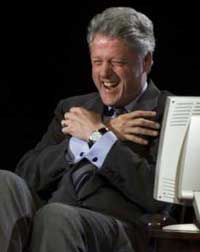|
Russian President Vladimir Putin had much
to smile about this past Christmas. Putin rewarded the
loyal Russian army by activating a new unit of Topol-M
ICBMs.
 The
activation of the latest Topol missile unit brings the
total to 40 of the advanced missiles in service. The
Topol-M is armed with a lightweight H-bomb design that
can muster over a half-million tons of TNT in punch. The
activation of the latest Topol missile unit brings the
total to 40 of the advanced missiles in service. The
Topol-M is armed with a lightweight H-bomb design that
can muster over a half-million tons of TNT in punch.
The Topol missiles were deployed by
Russia on Dec. 21 in the Saratov region and are now
ready to hurl their single H-bomb warheads to any point
on Earth. Ironically, the new Russian 550 kiloton
warhead was created with the help of Bill Clinton and
U.S. computer maker Silicon Graphics.
In 2003, Mountain View-based Silicon
Graphics pleaded guilty to two felony counts of illegal
exports to the Russian nuclear weapons lab in 1996. In
1997 the GAO wrote a report on what Silicon Graphics
exported.
 "Silicon
Graphics sold four computers to Chelyabinsk-70 in the
fall of 1996 for $650,000," states the 1997 GAO
report on supercomputer exports. Chelyabinsk-70 is well
known as a major Russian nuclear weapons lab. "Silicon
Graphics sold four computers to Chelyabinsk-70 in the
fall of 1996 for $650,000," states the 1997 GAO
report on supercomputer exports. Chelyabinsk-70 is well
known as a major Russian nuclear weapons lab.
In fact, IBM and Silicon Graphics both
sold supercomputers directly to Russian atomic weapons
labs. IBM was fined $8.5 million on its $7 million sale.
Then-Commerce spokesman Eugene Cotilli pointed out in
October 1998 that the Commerce Department investigation
led to the conviction.
However, the Clinton administration
did not start investigating until the Russian minister
in charge of MINATOM (Ministry of Atomics) announced
publicly that the U.S. computers would be used for
nuclear weapons research.
Clinton Export Policy
It was no accident that supercomputers
left America bound for nuclear labs in the Ural
Mountains. In 1994, Silicon Graphics and several other
major computer companies hired Tony Podesta to lobby for
them. Tony Podesta is the brother of John Podesta, then
the assistant to the president and staff secretary for
Bill Clinton.
In 1994, John Podesta was charged with
Clinton computer technology export policies such as
high-speed systems. In 1994, Sun, Silicon Graphics and
Cray supercomputers were all suddenly authorized to
travel with Ron Brown to Russia, India, China and other
points on the globe.
In 1995, during John Podesta's employ
at the White House, computer CEOs and a lobbyist from
Tony Podesta's company attended a secret meeting at the
White House on supercomputer exports. The group of
computer companies then represented by Tony Podesta
admitted in writing that they attended more than one
"classified" briefing held by the Clinton
administration.
China and Russia Not a Threat
 The
computer companies and Tony Podesta obtained secret
access to the Clinton White House for a reason. The
computer companies and Tony Podesta obtained secret
access to the Clinton White House for a reason.
According to a May 1995 document sent
to Ron Brown by the Podesta lobbyist, "controls on
computer exports to Russia and China for commercial,
civil end-users should be eliminated; controls on
exports for actual military end-uses may be appropriate
until there is greater certainty that neither country
poses a threat to U.S. national security."
I must note that directly after the
exports to Russia took place, John Podesta left the
Clinton White House to work for – you guessed it –
his brother at Podesta Associates.
In response to a series of questions
about his interests in the illegal exports, John Podesta
replied through Clinton White House attorney Michael B.
Waitzkin that he sought and was granted a waiver of
conflict of interest from White House counsel in 1997.
Please note that John Podesta obtained
that waiver some four years after his original term of
service, two years after the closed meetings were held
and a year after the illegal exports took place.
Sun Export
Another prime example occurred on Dec.
26, 1996, when a Hong Kong reseller for Sun
Microsystems, Automated Systems Ltd., sold a
supercomputer to the Chinese Scientific Institute, a
technical institute under the Chinese Academy of
Sciences, a state laboratory specializing in parallel
and distributed processing.
At some point after the sale but
before delivery, the computer was sold to the Yuanwang
Corporation. Yuanwang is an entity of the Chinese army
unit COSTIND (Commission on Science, Technology, and
Industry for National Defense). Yuanwang supplies
equipment to the Chinese nuclear weapons labs at Lop
Nor.
According to the Chinese Foreign
Ministry, Sun Microsystems had been aware of this
corporation's Chinese military ties. There is ample
evidence that the Chinese were not lying.
PLA Nuke Lab
According to the Commerce Department's
own documents, several meetings with Chinese army-owned
companies took placed prior to the export to Yuanwang.
The documents include a list of Chinese military
companies, compiled by Commerce and given to the Clinton
administration by People's Liberation Army (PLA) Gen.
Ding Henggao. Yuanwang is one such company.
On April 6, 1994, an unclassified memo
was sent from Defense Intelligence Agency (DIA) official
Col. Blasko to Commerce officials Deliberti, Albanse and
Isbell. The memo states that Yuanwang Corporation was a
Chinese army-owned firm, along with other known PLA-owned
companies such as China National Nuclear and China
North, NORINCO.
In 1995, Commerce Department official
Barry Carter sent a letter with attachments to Eden Woon,
"Executive Director" of the Washington State
China Relations Council. Carter included with his letter
a Feb. 25, 1995, letter from Gen. Ding, complete with
military contacts for business. Included in the list
given to Woon was "YUANWANG CORP" – the PLA-owned
company responsible for the illegal Sun computer
transfer in 1996.
Sun Pays a Fine
In December 2003, Sun Microsystems
Inc. and its subsidiaries agreed to pay $291,000 in
fines after the computer giant allegedly exported
computers to China for military purposes.
Sun stated that it settled the case
"without admitting or denying the
allegations."
"Sun maintains comprehensive
procedures to comply with all aspects of U.S. and, where
applicable, foreign export control laws," states
the official company line e- mailed to questioning
reporters.
Despite the denial of wrongdoing, the
fact remains that China is fielding a new series of
lightweight nuclear bombs designed with the help of U.S.
supercomputers exported under the wandering eyes of Bill
Clinton.
Part of the Clinton legacy left to the
21st century is a whole new series of weapons that are
easier to manufacture, smaller, cheaper and ever more
popular among terrorists. The scientists who make the
weapons of mass destruction have been busy in 2003, and
several military powers will find new toys stuffed in
their jackboot stockings this Christmas.
However, H-bombs are not built by
elves working overnight in the North Pole but in secret
nuclear labs armed with U.S. supercomputers.
|